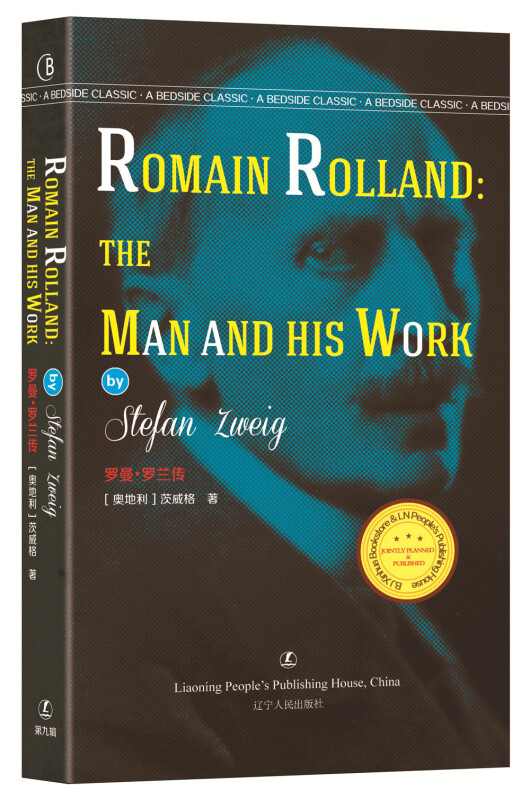
5分
罗曼.罗兰传

- ISBN:9787205093433
- 装帧:简裝本
- 册数:暂无
- 重量:暂无
- 开本:32开
- 页数:314
- 出版时间:2018-08-01
- 条形码:9787205093433 ; 978-7-205-09343-3
本书特色
典英语文库”自2013年8月上市至今,整套图书已出版七辑共120部作品。图书选本方面,皆来自世界经典名著,涉及政治、艺术、人文、诗歌、小说等各个领域,原文呈现名著原貌,满足不同读者的阅读需求,《了不起的盖茨比》《哈姆雷特》等经典读本更是为广大读者所追捧。图书设计上,完全遵循国外名著图书的经典流行开本规范,掌中书的大小便携、易读;封面设计、正文版式、印刷材质等方面更是精益求精,力求将*经典、*纯粹的外国文学带给广大的中国读者,更新大家的英文图书阅读习惯。
内容简介
罗曼 罗兰,思想家、文学家、音乐评论家、社会活动家、1915年诺贝尔文学奖得主,1866年出生于法国卡拉姆西。罗兰深受贝多芬、莎士比亚、托尔斯泰、马尔维达等巨人思想的影响,一生致力于人类进步事业,被誉为“欧洲的良知”。作者茨威格从罗兰的童年写起,直至1919年罗兰的《精神独立宣言》发表。与一般传记不同,茨威格不拘泥于罗兰的生平梳理,而是通过解读贝多芬、莎士比亚、托尔斯泰等名人对罗兰产生的重要影响,刻画罗兰的个性气质、人格形成、命运走向,分析其执着的人生信念与人格魅力,彰显罗兰思想和作品的巨大影响力。
目录
CHAPTER 1
CHAPTER 2
CHAPTER 3
CHAPTER 4
CHAPTER 5
CHAPTER 6
CHAPTER 7
CHAPTER 8
CHAPTER 9
CHAPTER 10
CHAPTER 11
CHAPTER 12
CHAPTER 13
PART TWO EARLY WORK AS A DRAMATIST
CHAPTER 1
CHAPTER 2
CHAPTER 3
CHAPTER 4
CHAPTER 5
CHAPTER 6
CHAPTER 7
CHAPTER 8
CHAPTER 9
CHAPTER 10
CHAPTER 11
CHAPTER 12
CHAPTER 13
CHAPTER 14
CHAPTER 15
CHAPTER 16
CHAPTER 17
CHAPTER 18
CHAPTER 19
PART THREE THE HEROIC BIOGRAPHIES
CHAPTER 1
CHAPTER 2
CHAPTER 3
CHAPTER 4
CHAPTER 5
CHAPTER 6
PART FOUR JEAN CHRISTOPHE
CHAPTER 1
CHAPTER 2
CHAPTER 3
CHAPTER 4
CHAPTER 5
CHAPTER 6
CHAPTER 7
CHAPTER 8
CHAPTER 9
CHAPTER 10
CHAPTER 11
CHAPTER 12
CHAPTER 13
CHAPTER 14
CHAPTER 15
CHAPTER 16
CHAPTER 17
CHAPTER 18
PART FIVE INTERMEZZO SCHERZOSO
CHAPTER 1
CHAPTER 2
CHAPTER 3
CHAPTER 4
PART SIX THE CONSCIENCE OF EUROPE
CHAPTER 1
CHAPTER 2
CHAPTER 3
CHAPTER 4
CHAPTER 5
CHAPTER 6
CHAPTER 7
CHAPTER 8
CHAPTER 9
CHAPTER 10
CHAPTER 11
CHAPTER 12
CHAPTER 13
CHAPTER 14
CHAPTER 15
CHAPTER 16
CHAPTER 17
CHAPTER 18
CHAPTER 19
CHAPTER 20
CHAPTER 21
CHAPTER 22
CHAPTER 23
节选
His first years of childhood were passed in theshadow of the defeat of 1870. In Antoinette, Rollandsketches the tranquil life ofjust such a provincial townas Clamecy. His home was an old house on the bankof a canal. Not from this narrow world were to springthe first delights of the boy who, despite his physicalfrailty, was so passionately sensitive to enjoyment. Amighty impulse from afar, from the unfathomable past,came to stir his pulses. Early did he discover music,the language of languages, the first great message ofthe soul. His mother taught him the piano. From itstones he leamed to build for himself the infinite worldof feeling, thus transcending the limits imposed bynationality. For while the pupil eagerly assimilatedthe easily understood music of French classicalcomposers, German music at the same time enthralledhis youthful soul. He has given an admirabledescription of the way in which this revelation cameto him: “We had a number of old German musicbooks. German? Did I know the meaning of theword? In our part of the world I believe no one hadever seen a German ... I tumed the leaves of the oldbooks, spelling out the notes on the piano, ... and theserunnels, these streamlets of melody, which wateredmy heart, sank into the thirsty ground as the rain soaksinto the earth. The bliss and the pain, the desires andthe dreams, of Mozart and Beethoven, have becomeflesh of my flesh and bone of my bone. I am them,and they are me.... How much do I owe them. When I was ill as a child, and death seemed near, a melody of Mozart would watch over my pillow like a lover.... Later, in crises of doubt and depression, the music of Beethoven would revive in me the sparks of eternal life.... Whenever my spirit is weary, whenever I amsick at heart, I turn to my piano and bathe in music.” Thus early did the child enter into communion with the wordless speech of humanity; thus early had the all-embracmg sympathy of the life of feeling enabled him to pass beyond the narrows of town and of province, of nation and of era. Music was his first prayer to the elemental forces of life; a prayer daily repeated in countless forms; so that now, half a century later, a week and even a day rarely elapses without his holding converse with Beethoven. The other saint of his childhood‘s days, Shakespeare,likewise belonged to a foreign land. With his first loves, all unaware, the lad had already overstridden the confines of nationality. Amid the dusty lumber in a loft he discovered an edition of Shakespeare,which his grandfather (a student in Paris when Victor Hugo was a young man and Shakespeare mania was rife) had bought and forgotten. His childish interest was first awakened by a volume of faded engravings entitled Galerie des femmes de Shakespeare. His fancy was thrilled by the charming faces, by the magical names Perdita, Imogen, and Miranda. But soon,reading the plays, he became immersed in the maze of happenings and personalities. He would remain in the loft hour after hour, disturbed by nothing beyond the occasional trampling of the horses in the stable below or by the rattling of a chain on a passing barge.Forgetting everything and forgotten by all he sat in a great armchair with the beloved book, which like that of Prospero made all the spirits of the universe his servants. He was encircled by a throng of unseen auditors, by imaginary figures which formed a rampart between himself and the world of realities.
……
作者简介
Stefan Zweig (28 November 1881-22 February 1942) was an Austrian novelist, playwright, joumalist and biographer. At the height of his literary career, in the 1920s and 1930s, he was one of the most popular writers in the world.
-

地心游记(纯英文)/床头灯英语.3000词读物
¥9.0¥15.8 -

THE GREAT GATSBY-了不起的盖茨比
¥5.0¥16.8 -

茶花女
¥5.3¥12.0 -

小妇人(纯英文)/床头灯英语.3000词读物
¥4.7¥15.8 -

本杰明:富兰克林自传
¥5.9¥13.5 -

飞鸟集(泰戈尔英汉双语诗集)
¥9.5¥11.9 -

写给儿童看的英语:情境联想600句(英汉对照)
¥17.1¥39.8 -

沉思录
¥10.5¥21.0 -

方法论
¥3.3¥9.5 -

小王子:中法英三语对照
¥7.6¥28.0 -

流浪地球刘慈欣
¥16.7¥62.0 -

英文疑难详解续篇
¥24.8¥45.0 -

城堡
¥13.0¥26.0 -

查拉图斯特拉加是说
¥14.5¥29.0 -

巴黎圣母院
¥4.7¥15.5 -

英诗选译-孙大雨译文集-(英汉对照)
¥12.2¥36.0 -

莎士比亚四大悲剧(世界文学名著英文版)
¥10.2¥32.0 -

简.爱-英语原著版
¥6.4¥16.8 -

四级词汇词根+联想记忆法:乱序版
¥15.4¥48.0 -

无英语词根与单词的说文解字(新版)(2020)
¥52.7¥65.9












